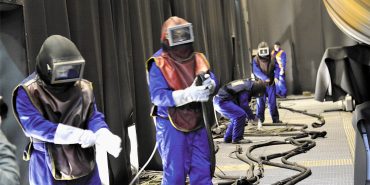How to help employees fight the stress caused by war?
Poles have long been the most stressed employees. Recent years have not improved these statistics. We have barely tamed the situation related to coronavirus, lockdowns and remote work when we have to face another challenge – the war in Ukraine. And this affects the sense of danger of employees.
Stress has been called the disease of the century by the WHO because it is the cause of many diseases, and burnout from this year is considered a disease, according to the International Classification of Diseases. Long-term exposure to stress actually has a negative impact on the whole body, contributing m.in to lower mood, decreased efficiency and commitment, more mistakes, increased absenteeism, etc.
In everyday working life, stress is our inseparable companion. It has two faces – mobilizing stress (eustress), which is an activating factor for action and distress, i.e. demotivating stress associated with difficult situations, which – if it lasts a long time – can have a negative impact on our well-being and work.
– After taming the stress associated with the pandemic, we now have to face a new challenge – fears resulting from the ongoing war in Ukraine. There is nothing to hide – each of us feels a more or less conscious stress associated with this situation. As employers, we must be aware of this and take steps that will at least to some extent reduce the tension in the team, regardless of whether it includes people from Ukraine or not – emphasizes Maciej Kabaciński, Head of the HR Division at Quercus, specializing in SAP implementations in the HR area.
The stress of the war in Ukraine in companies can affect five levels:
- fear of workers from Ukraine for their loved ones who are fighting in the war or cannot get out of the besieged towns,
- disturbance in the fluidity of processes related to the departure of some employees to the war in Ukraine (and fear for their health and life),
- employees’ concerns about broadly understood security and peace in Poland,
- anxiety about the financial condition of the company, resulting from the difficult economic situation (fuel prices, rising inflation, problems with raw materials, shortage of employees, e.g. in the construction industry and the related increase in executive costs),
- anxiety about work related to the appearance on the market of a large number of potential new employees from Ukraine, regarding increasing competitiveness in the labor market or the likelihood of reorganization in the company.
„As managers, we should examine what employees’ fears may result from, because each of these factors may involve the need to introduce other corrective and stress-reducing measures” – emphasizes the Quercus expert. He adds: „We have some experience in supporting employees who feel overloaded, work under time pressure, run projects associated with the risk of errors with large consequences, as well as – related to the pandemic – with remote work and remote project management. But the stress of war is a situation we haven’t been prepared for for generations.
Everyone feels stress individually. What for some is a situation that causes a slight stress, for others can be paralyzing. That is why it is so difficult to measure the level of stress, although of course it is not impossible. The role of managers is to assess the level of stress in the team and introduce solutions that will allow it to be reduced, because in the face of the war to reduce fears, there can be no question.
The basic tool is, of course, conversation. However, not everyone will openly admit that anxiety about the war affects his work. It is managers who should make employees aware that they know that this is happening, that they understand this situation, but also try to introduce solutions that will allow them to deal with it.
– Excessive stress burden is often manifested by a decrease in motivation or more frequent mistakes – these elements can be detected using advanced management tools, such as SAP SuccessFactors, which allow us to examine the level of motivation of employees and analyze their work based on objective premises. These „dry” data are a good, neutral starting point for talking to an employee and trying to help, sometimes also psychological. We cannot leave an employee burdened with stress alone, because it is a situation that is unfavorable both for him and for the company as an organization – explains Maciej Kabaciński.
Of course, war is a situation over which – as individuals – we have no influence. A passive attitude towards the tragedy of Ukraine in many cases may mean an increase in the level of stress. A sense of agency helps to fight it. For many people, the possibility of helping, organizing collections, volunteering or accepting refugees under their roof can have a positive effect. Also, company donation collections and group involvement of employees in projects for Ukraine can reduce stress in the team and improve its motivation (also to work, on the principle – I will complete the task faster, I will help faster).
In the fight against the stress associated with the war in Ukraine, m.in can be helpful:
- friendly and ergonomic working environment,
- in-depth analysis of employees’ competences and the degree of workload and the risk of work-related stress, postponement of tasks, temporary relief of the most stressed people,
- introduction of flexible working time, e.g. for employees active in volunteering,
- launching a chillout room where employees can calm down or relax, e.g. by playing games,
- supporting physical activity (enabling exercises during work, company sports passes),
- specialist (psychological) help – the possibility of consulting a specialist employed by the company,
- a company support program for Ukraine, which can have a positive impact on motivation to work – the better its effects, the greater the help.
– Of course, these practices are not a remedy for stress related to the situation in Ukraine. But we should take action that will allow, if not liquidated, then tame the fear of war for workers. Regardless, creating a platform to talk about it is also a good idea. Conversation has a cleansing effect. We should also treat employees from Ukraine differently – it is worth giving them a signal that we understand the situation in which they find themselves and that they can expect support from the company – sums up Maciej Kabaciński.
Poles have long been the most stressed employees. Recent years have not improved these statistics. We have barely tamed the situation related to coronavirus, lockdowns and remote work when we have to face another challenge – the war in Ukraine. And this affects the sense of danger of employees.
Stress has been called the disease of the century by the WHO because it is the cause of many diseases, and burnout from this year is considered a disease, according to the International Classification of Diseases. Long-term exposure to stress actually has a negative impact on the whole body, contributing m.in to lower mood, decreased efficiency and commitment, more mistakes, increased absenteeism, etc.
In everyday working life, stress is our inseparable companion. It has two faces – mobilizing stress (eustress), which is an activating factor for action and distress, i.e. demotivating stress associated with difficult situations, which – if it lasts a long time – can have a negative impact on our well-being and work.
– After taming the stress associated with the pandemic, we now have to face a new challenge – fears resulting from the ongoing war in Ukraine. There is nothing to hide – each of us feels a more or less conscious stress associated with this situation. As employers, we must be aware of this and take steps that will at least to some extent reduce the tension in the team, regardless of whether it includes people from Ukraine or not – emphasizes Maciej Kabaciński, Head of the HR Division at Quercus, specializing in SAP implementations in the HR area.
The stress of the war in Ukraine in companies can affect five levels:
- fear of workers from Ukraine for their loved ones who are fighting in the war or cannot get out of the besieged towns,
- disturbance in the fluidity of processes related to the departure of some employees to the war in Ukraine (and fear for their health and life),
- employees’ concerns about broadly understood security and peace in Poland,
- anxiety about the financial condition of the company, resulting from the difficult economic situation (fuel prices, rising inflation, problems with raw materials, shortage of employees, e.g. in the construction industry and the related increase in executive costs),
- anxiety about work related to the appearance on the market of a large number of potential new employees from Ukraine, regarding increasing competitiveness in the labor market or the likelihood of reorganization in the company.
„As managers, we should examine what employees’ fears may result from, because each of these factors may involve the need to introduce other corrective and stress-reducing measures” – emphasizes the Quercus expert. He adds: „We have some experience in supporting employees who feel overloaded, work under time pressure, run projects associated with the risk of errors with large consequences, as well as – related to the pandemic – with remote work and remote project management. But the stress of war is a situation we haven’t been prepared for for generations.
Everyone feels stress individually. What for some is a situation that causes a slight stress, for others can be paralyzing. That is why it is so difficult to measure the level of stress, although of course it is not impossible. The role of managers is to assess the level of stress in the team and introduce solutions that will allow it to be reduced, because in the face of the war to reduce fears, there can be no question.
The basic tool is, of course, conversation. However, not everyone will openly admit that anxiety about the war affects his work. It is managers who should make employees aware that they know that this is happening, that they understand this situation, but also try to introduce solutions that will allow them to deal with it.
– Excessive stress burden is often manifested by a decrease in motivation or more frequent mistakes – these elements can be detected using advanced management tools, such as SAP SuccessFactors, which allow us to examine the level of motivation of employees and analyze their work based on objective premises. These „dry” data are a good, neutral starting point for talking to an employee and trying to help, sometimes also psychological. We cannot leave an employee burdened with stress alone, because it is a situation that is unfavorable both for him and for the company as an organization – explains Maciej Kabaciński.
Of course, war is a situation over which – as individuals – we have no influence. A passive attitude towards the tragedy of Ukraine in many cases may mean an increase in the level of stress. A sense of agency helps to fight it. For many people, the possibility of helping, organizing collections, volunteering or accepting refugees under their roof can have a positive effect. Also, company donation collections and group involvement of employees in projects for Ukraine can reduce stress in the team and improve its motivation (also to work, on the principle – I will complete the task faster, I will help faster).
In the fight against the stress associated with the war in Ukraine, m.in can be helpful:
- friendly and ergonomic working environment,
- in-depth analysis of employees’ competences and the degree of workload and the risk of work-related stress, postponement of tasks, temporary relief of the most stressed people,
- introduction of flexible working time, e.g. for employees active in volunteering,
- launching a chillout room where employees can calm down or relax, e.g. by playing games,
- supporting physical activity (enabling exercises during work, company sports passes),
- specialist (psychological) help – the possibility of consulting a specialist employed by the company,
- a company support program for Ukraine, which can have a positive impact on motivation to work – the better its effects, the greater the help.
– Of course, these practices are not a remedy for stress related to the situation in Ukraine. But we should take action that will allow, if not liquidated, then tame the fear of war for workers. Regardless, creating a platform to talk about it is also a good idea. Conversation has a cleansing effect. We should also treat employees from Ukraine differently – it is worth giving them a signal that we understand the situation in which they find themselves and that they can expect support from the company – sums up Maciej Kabaciński.





